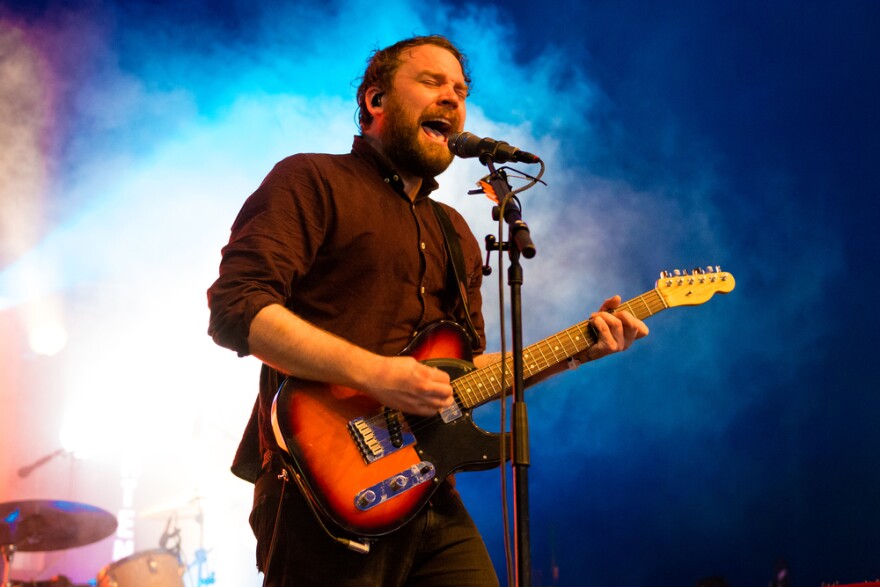Scott Hutchison was great at writing songs. He built scaffolding out of sorrow and sarcasm, and then invited everyone to climb up and look out over their own emotional wreckage. Frightened Rabbit was the vehicle, but Scott was the engine, the sparks, and the weary mapmaker. A year after his passing in 2018, we pulled together three interviews—2013, 2016, and 2017—as a way of remembering the man, the music, and the mischief.
The first time I got him on mic was in 2013. We sat on a grassy hill outside Louisville’s Iroquois Amphitheater while Frightened Rabbit toured with The National—a pairing Hutchison joked was “the most depressing, drinky tour of all time.” We talked bourbon versus scotch (he picked bourbon), the band’s shift to a major label, and how songwriting became both a release and a curse. “I revealed too much of myself on the album before,” he admitted, referencing The Winter of Mixed Drinks. “It was maybe even like a sense of embarrassment.” He wasn’t being dramatic. He was being Scottish. “Treat the worst times in your life with humor,” he said. “That’s the trait.”
He talked about making pop songs, even if no one wanted to admit they were pop. He defended his accent and mocked the trend of singing in mid-Atlantic mush to crack the American market. He dismissed the idea of “selling out” with a label switch, joking, “I was all ready for a fight, and it never came. So I just put my gloves down.” That was Scott: always willing to spar, but never punching down.
In 2016, he was back—this time in the WFPK studios promoting Painting of a Panic Attack. He’d lived in America for two years. The band had become vegetarians, created a “health tour” contract, and docked each other’s per diems for eating fries or pizza. They joked about fast food, deep-fried Scottish delicacies, and the abomination that is corn-topped American pizza . But behind the banter was a man trying—earnestly—to be better, feel better, live better.
He told me about writing an article from the perspective of a tree, which was somehow both hilarious and heartfelt. “I don’t think many people are empathetic with trees,” he said. “I’m not a hippie… but maybe I am.” We spiraled into chocolate pudding on sausage pizza, nostalgia flavors, and how writing songs was easier than writing prose because “you’ve got a structure to hang your vocabulary on.” Hutchison always had the vocabulary—sharp, playful, devastatingly precise.
The final interview was a 2017 phone call after Frightened Rabbit released the Recorded Songs EP. He was back in Scotland after a stint in Los Angeles that left him sunburned and spiritually misaligned. “I missed the seasons,” he confessed. “I gave it my best shot and it didn’t work out.” He talked about the songs that didn’t fit on Painting of a Panic Attack, songs that were too raw, too acoustic, too much like himself. “They weren’t b-sides,” he insisted. “They just didn’t fit.”
That EP included a collaboration with Julian Baker—one of the few voices who could meet his on equal emotional footing. “She said yes immediately,” he said, clearly still delighted. We laughed about his guitar getting lost in Africa, the 10th anniversary of Midnight Organ Fight, and the scalper mess surrounding their tour. “I couldn’t help but focus on the people who didn’t get tickets,” he said, which might as well have been his mission statement.
In that last chat, I told him what I’d always believed: his songs made us feel seen. He deflected, but you could tell it meant something. It always did.
Scott’s final public words were posted to Twitter: “Be so good to everyone you love. It’s not a given.” He added, “I didn’t live by that standard and it kills me.”
But he did. In ways that mattered. In songs that ache and pulse and stretch long after the music stops. He left us the map he made. All we have to do now is keep walking.
Listen to all three interviews above or watch them individually below.
RESOURCES FOR YOU, FAMILY AND FRIENDS
Louisville Suicide Prevention Lifeline - 502-589-4313 National Suicide Prevention Lifeline - 1-800-273-TALK (8255) American Foundation for Suicide Prevention page on Mental Health during COVID-19 Kentucky chapter of American Foundation for Suicide Prevention Seven Counties Services: Adult Crisis Line 502-489-5313
Seven Counties Services: Child Crisis Line 502-589-8070
Mental Health Lou
The Veterans Crisis and Military Crisis Line - 1-800-273-8255 Press 1
Crisis Text Line (free text message service) - 741-741
Kentucky Nurses Association:Kentucky Nurses Helping Nurses 1-877-358-0420


